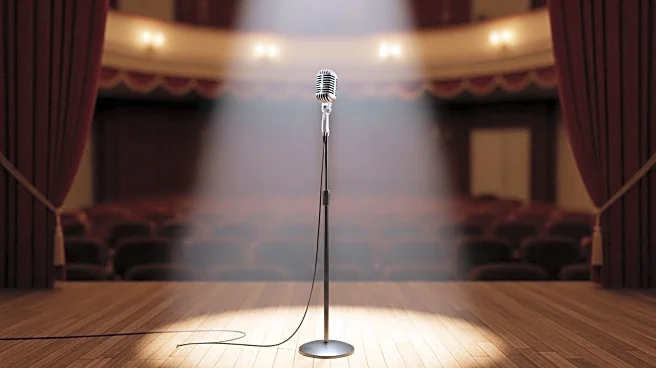What's Happening?
Nate Bargatze, hosting the Emmy Awards for the first time, opened the 2025 ceremony with a humorous sketch inspired by Saturday Night Live. The sketch featured Bargatze as Philo Farnsworth, the inventor of television, alongside SNL cast members Bowen Yang, Mikey Day, and James Austin Johnson. Bargatze humorously critiqued the television industry, highlighting the paradoxes of streaming services and the popularity of shows about murderers. He also joked about the Emmy Awards themselves, noting that winning shows often do not have the most viewers, with most people preferring football and Yellowstone. Bargatze aimed to keep the night light-hearted, avoiding controversy, especially in light of recent national tragedies.
Why It's Important?
The Emmy Awards are a significant event in the television industry, celebrating achievements and setting trends for future content. Nate Bargatze's approach to hosting reflects a shift towards humor and relatability, potentially influencing how award shows are conducted in the future. By addressing the realities of streaming services and viewer preferences, Bargatze highlights ongoing changes in media consumption. His decision to avoid political controversy underscores a broader trend in entertainment to focus on inclusivity and universal appeal, which could impact how audiences engage with award shows and the industry at large.
What's Next?
Following Bargatze's hosting, there may be discussions within the industry about the role of humor and relatability in award shows. Stakeholders might consider how to balance entertainment with the recognition of serious achievements. The Emmy Awards could see changes in format or presentation style in future editions, influenced by Bargatze's approach. Additionally, the industry might explore new ways to engage audiences who prefer streaming and non-traditional viewing methods, potentially leading to innovations in how content is delivered and celebrated.
Beyond the Headlines
Bargatze's hosting style raises questions about the cultural role of award shows in a rapidly changing media landscape. As streaming services continue to evolve, the traditional metrics of success and viewership are being challenged. This shift may lead to broader discussions about the value and impact of awards in an era where content is consumed in diverse ways. Furthermore, Bargatze's avoidance of political topics reflects a growing desire for entertainment spaces to serve as neutral grounds, fostering unity rather than division.











